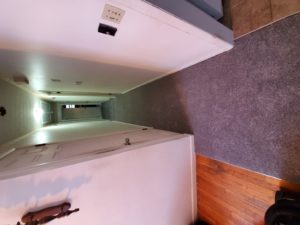Decoding Commercial Flooring: Choosing the Perfect Fit for Your Space


Selecting the right flooring for commercial spaces involves carefully balancing aesthetics, functionality, durability, and budget considerations. With an array of options available, from traditional choices like carpet and hardwood to modern alternatives like luxury vinyl and polished concrete, finding the perfect fit for your space can feel overwhelming. In this guide, we’ll explore the various types of commercial flooring to help you make an informed decision tailored to your specific needs.
Carpet Tiles:
Carpet tiles, also known as modular carpets, offer versatility and ease of installation, making them a popular choice for commercial spaces. They come in various colors, patterns, and textures, allowing creative design possibilities. Carpet tiles are relatively easy to maintain; individual tiles can be replaced if damaged or stained. However, there may be more durable options for high-traffic areas, and regular cleaning is essential to prevent dirt buildup.
Broadloom Carpet:
Luxurious Broadloom Carpet: Perfect for Diverse Commercial SpacesHowever, it may be more prone to staining and wear than other flooring options.
Hardwood Flooring:
Hardwood flooring exudes timeless elegance and sophistication, making it a popular choice for upscale commercial settings like boutiques, restaurants, and luxury hotels. It’s available in various species, finishes, and plank sizes, allowing customization to suit different design preferences. Hardwood floors are durable and can last decades with proper maintenance, including regular cleaning and refinishing. However, they may be susceptible to scratches, dents, and moisture damage, requiring careful consideration of location and maintenance protocols.
Laminate Flooring:
Budget-Friendly Laminate Flooring: Practical for Commercial Spaces. Laminate floors are easy to install, resistant to scratches and stains, and low maintenance, requiring regular sweeping and occasional mopping. However, they may not have the same warmth or authenticity as natural hardwood or stone.
Luxury Vinyl Plank (LVP) Flooring:
Luxury vinyl plank (LVP) flooring combines the aesthetics of hardwood with the durability and water resistance of vinyl, making it an attractive option for commercial spaces with high moisture levels or heavy foot traffic. LVP comes in various styles, including wood, stone, and tile looks, with realistic textures and finishes. It’s easy to install, maintain, and clean, requiring only regular sweeping and occasional mopping. Additionally, LVP is quieter and more comfortable underfoot than hardwood or laminate flooring.
Ceramic Tile Flooring:
Ceramic tile flooring is renowned for its durability, moisture resistance, and versatility, making it suitable for various commercial applications, including restaurants, restrooms, and lobbies. It comes in multiple sizes, shapes, colors, and patterns, allowing endless design possibilities. Ceramic tiles are easy to clean and maintain, resistant to stains and scratches, and hypoallergenic, making them ideal for allergy-prone environments. However, they may be susceptible to cracking under heavy loads or impacts.
Polished Concrete Flooring:
Popular Polished Concrete: Ideal for Commercial Spaces. Through grinding and polishing, concrete surfaces are smoothed to a glossy finish, enhancing light reflection and aesthetics. These floors resist stains, scratches, and moisture, and are easy to clean, ideal for busy areas and food service environments..
Choosing the right commercial flooring involves considering aesthetics, functionality, durability, maintenance requirements, and budget constraints. Whether you opt for carpet tiles, broadloom carpet, hardwood, laminate, luxury vinyl plank, ceramic tile, or polished concrete flooring, each option offers unique advantages suited to the needs of different commercial spaces. By understanding each flooring type’s characteristics and maintenance considerations, you can make an informed decision that enhances your retail space’s beauty, durability, and functionality.
